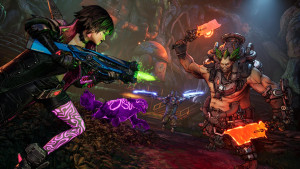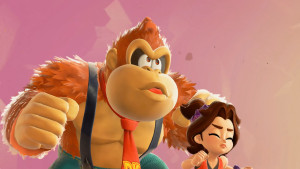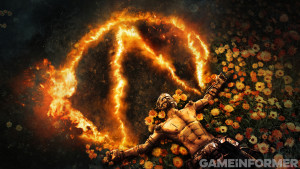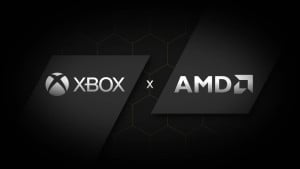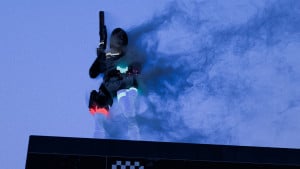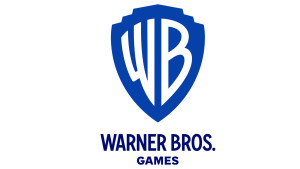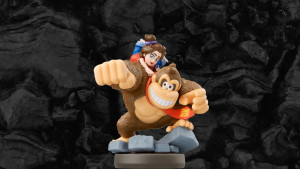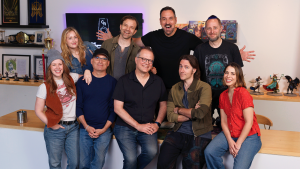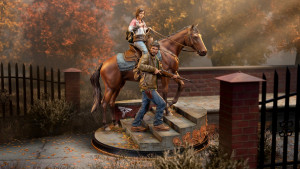Last chance for early bird pricing! Subscribe by June 25th to receive the debut issue
The Art Of Crafting Indie Game: The Movie

Filmmakers Lisanne Pajot and James Swirsky are the team behind a new documentary called Indie Game: The Movie, which offers a glimpse into the lives of the developers behind Braid, Super Meat Boy, and Fez. I spoke to the team for an article in the latest issue of Game Informer (#230), but one page couldn't hold the dozens of questions I had for Lisanne and James. Below is the bonus portion of that interview.
Do you want to talk a little bit about the beginning of the project? Originally you were going to go with a vignette style, right?
Lisanne Pajot: Yeah, we were inspired to do this piece based on a short that we had done on Alec Holowka, one of the co-creators of Aquaria...and we did a story about them and it had never occurred to us that games could be personal. That the whole act of making Aquaria was an emotional experience for Alec and then the game was reflective of that emotional experience.... So the piece was kind of heartbreaking and uplifting and we felt really good about it and it got a really good response online. It was a corporate video, really. It planted the seed, we thought that if we could get a bunch more people like this then we could make a film. We had been going down to the Game Developers Conference for a few years covering it for a tech organization in Canada and we’d always been drawn to the Indie Games Summit. There were all these people that would go up on stage and talk about their games but really they were just talking about themselves...
James Swirsky: Their personal experience.
LP: Yeah, a lot of these games were doing incredibly well and reaching millions of people, like World of Goo and Braid, and then we looked around and there weren’t a lot of documentaries about making games out there at the time.
JS: Yeah, and it kind of blew us back a little bit because here you have video games that are bigger than music and bigger than movies and there’s no documentaries on them, you know?
So jumping back a bit, I’m wondering how much you two followed games before you started the film.
LP: Well, we had followed the gaming industry and gaming through work that we had done with a tech organization in Canada. That was my experience, but James has a deeper experience in the games industry than I do.
JS: Yeah, Lisanne is not really a gamer so much but I was a complete Nintendo and Sega Genesis kid and games completely defined everything I did probably up til I was about 16 or 18, and then it kind of faded away a little bit. What really killed it or got me away from games was that I was a games tester in QA at Electronic Arts in Vancouver for about two years. It was a good and a bad experience.
What were some of the games that you worked on?
JS: Oh, I was on NBA Live 2001 and NBA Street and I did a little bit of NHL 2001.... NBA Live was actually one of my favorite games going into it and it just completely killed the magic of games for me. For eight years or so I didn’t touch video games after working there and it wasn’t until we started going down to GDC and hanging around the Indie Games Summit that games started to get interesting to me again. World of Goo and Braid and all this stuff, they feel different. They look great, they look like real games...
But they have a bit of a soul.
JS: Yeah, you could feel that there was someone who made this and they have something to say and it feels hand-crafted and it feels like someone is on the other side of this game.
I want to talk a little bit about what I think is the first gut-shot of the film: when you can hear Lisanne ask Phil [Fish, creator of Fez] what would happen if the game didn’t come out and he said that he would kill himself.
LP: Yeah.
What kind of reaction have you gotten from that scene?
LP: I totally didn't expect him to say that. And he is cool with it being out there, which is fine. I think it really strikes people when they watch the film, you watch only about thirty minutes and everything seems like it’s moving at a pace and is semi-positive and stakes are being raised and then all of a sudden the film changes. It sort of kicked off an act of the film that you didn’t expect.... So I think the key thing with that scene is that it’s uncomfortable because you’re not too sure where he lies and what he means. Of course you want to care for him.... From a film perspective, people are shocked by it, but they also want Phil to succeed.
Is it an odd feeling that part of you is excited the more stressed out he gets because you know that it’s great footage? Do you want to talk about that balance between rooting for him versus rooting against him for the result of a better film?
LP: Hmmm...yeah, I don’t know.
JS: When that stuff is going on you feel anxious and you feel in the moment...but you’re so in it that you’re thinking about where this places in the film. When something like this happens, the other half of your brain is like, “Oh my God, I can't believe this is happening.” You start to feel for these guys, so you get what you need to get in order to tell a story and then the camera goes off and you try to be a human being with these guys. You try to empathize with them and try to help them out as best you can while never really affecting the story. I think the good thing about that is that we didn't really have any power to affect the story, so it’s basically just get what you need, and then just kind of see what happens and see how you can make it better for the person going through this horrible, horrible moment in front of you.
So was it the kind of relationship that didn’t need a release form? Was there ever any talk of, “Hey, if this thing becomes huge, maybe we can split the proceeds between developers and filmmakers?”
LP: Uh...no. (laughs)
JS: In documentaries you can’t...well, you shouldn't do that. You don’t pay your subjects at all. But it’s very strange, that kind of blue skying never really came up because we didn’t think it would be what it turned out to be. [Laughs]

A sliver of the editing timeline for Indie Game: The Movie.
So I don’t want to spoil anything, but there’s a certain video of somebody reacting to Braid in the film. Did Jon know about that video or how did that come about?
LP: Jon knows a lot about the reaction to Braid when it came out. A lot of the videos that came out in reaction to Braid were interesting to us, and the interplay between the way people interpret your work online and the way you feel about your work. We have a lot of reactions from people online in the film; it’s kind of like the fifth character.
It was really fascinating and it must be bizarre for reviewers of Super Meat Boy to watch footage of Edmund [McMillen, co-creator of Super Meat Boy] reacting to their review. That’s just something that you never could have imagined you’d see.
LP: [Laughs] Yeah, you know we didn’t actually consider that until we started seeing reactions on the Internet from reviewers seeing the reaction to their reviews in the film. It hadn't totally occurred to us that they would be shocked by it. Because we were there in the moment and it was like, “Of course someone's going to react to it, they care about their work!” Of course people are going to be happy or deflated.
JS: You never see that!
LP: I guess that’s true, you never get to see that.
JS: And I guess the reviewer from Gamespot...
Tom McShea.
JS: Yeah, he wrote this really interesting article about watching Edmund in that scene react to that review. Because that review was a big moment in their day.
LP: Oh, huge.
So after I watched the film, I was thinking about the structure of it and I realized – and I don’t know if you guys have seen it – but it’s similar to a music documentary called It Might Get Loud.
LP: No.
JS: Yeah, I’ve seen pieces of that. Is that the one with Jack White?
Yeah. Jack White, Jimmy Page, and the Edge. That documentary builds to a “summit” where they get the three together. Did you guys ever think of doing that for this film? Getting Jonathan Blow, Phil Fish, and Team Meat together for a conversation?
JS: Yeah, I’ve actually thought about doing that. Not so much for the film but, as an extra. I would love to get Edmund and Phil and Jon and Tommy all around a table talking about each others' games. Especially because – I was just thinking about this last night – Super Meat Boy and Fez are such opposite games, but they come from the same place in a weird way.
The same Nintendo roots?
JS: Yeah, completely. So I’d love to. I have a list of fantasy special edition features that I want to do. Even if it comes after the special edition is done and we could just put it online. It’s a great idea to get them together.

Do you want to talk about the choice to make the HBO/Scott Rudin show a fictional narrative and not a documentary series?
JS: Well, that’s not our choice. We agree with it and we think it's great, but that’s something that Scott Rudin and HBO wanted to do and they thought the movie would be a great basis for it. And so they are bringing us on as consulting producers. In terms of status, things are still really early, and I know they are moving forward with it and investigating writers and investigating what they want the show to look like and feel like, and all that stuff.
I think some fans might worry that it’s just going to be a parody or a mock version of Super Meat Boy, a retelling of those stories. Will it be new stories and new games?
JS: Yeah, it wouldn't be the Edmund story or there wouldn't be a Phil Fish character in it. It is a completely fictionalized world.
Could you see yourself moving into narrative film?
JS: Yeah, totally. I think every filmmaker has their scripts that they’ve always been working on and we are no exception. We started out doing narrative stuff and it evolved into documentaries, but I would love the opportunity to do it. But I still love doing documentaries.

I remember that Brad Bird mentioned you on Twitter after seeing the film.
JS: Oh yeah, that was a huge highlight. Brad Bird and then Kevin Smith gave us a shout out. I’m so glad we didn’t know he was in the audience.
LP: Ugh!
JS: Lisanne actually met [Brad Bird], but didn’t realize it!
How did that happen?
LP: He had a group of people outside and they were just tyring to figure out if they had enough tickets and I just said “Oh, I have one more ticket if you need the extra ticket.” And it was a whole crew from Pixar! I had no idea.
JS: I showed her a picture of Brad Bird afterwards and she was like, “Yeah, that’s the guy!”
So have you guys been contacted by any video game companies looking to make behind the scenes videos or development diaries?
LP: Not yet! [Laughs]
JS: No, but we’d be open to it for sure, because it would be interesting to have full access in the triple-A space.
LP: If we were able to get similar access to what we could get in this film, I think it could be something pretty good. Of course, there’s that pressure that anything we make after this...I don’t know if we could do better.
JS: Well, you’d just have to take a different angle.... You wouldn’t set yourself up to make Indie Game The Movie 2 with some other developers.
LP: It would have to be completely different
You guys got started on Kickstarter back before Kickstarter was cool. With the recent explosion of funding for games, do you think there will be a related explosion for gaming documentaries?
LP: I think that’s already happening. I think it's incredible; we’re at a time with Kickstarter where you can show the world what you can do with just a little slice and then ask if they want more.
JS: I think to have a successful Kicktarter you need to put a lot of effort into it, even pre-pitch. Just communicating what you want to do and proving that you can do it.... It’s fantastic, but I think some people aren’t putting enough effort into it or just assuming that there’s all these people on the Internet that want to give money instead of putting forward a compelling product, making a convincing argument.... All that stuff to the side, it’s such an amazing time to be a creator. To make anything, because technically and in terms of distribution and of funding, all these tools are just so amazing. Yeah, it’s a cool time to be alive. [Laughs]
LP: You can use that as your end quote.

James Swirsky risking life and limb to get a shot for Indie Game: The Movie.
Do you want to talk about the biggest lesson from this film, as far as film production goes?
JS: In a very real film production way, it would be never stop filming.... The oddest things made it into the film, things that I didn’t expect. Never stop filming. Don’t be afraid of getting too much. A lot of the greatest moments were just completely unexpected moments. Just casually filming on the beach with that guy and his metal detector.
That scene looked great.
JS: Yeah! It just works as a visual part of the film. The whole thing with documentaries is that you make your best plan possible and then you are constantly deviating from it.
I’m wondering if you two have any simple advice for aspiring filmmakers out there.
JS: Everything I’ve learned over the past five to six years has come from online. It came from a collection of blogs, from independent guys, one-man-band video guys producing amazing work.... One's called the C47, there’s a podcast called the RC Center, there’s nofilmschool.com, philbloom.net, and all these fantastic guys that just share everything they do. Filmotion – their educational blog is amazing.
All of those blogs and all those guys gave us the information and the tips and tricks that were needed to be prepared to do this movie. It was five years of paying attention to all these guys that were online and sharing that turned us into what we are.... We’ve produced a decade of work that is not great. It started out bad and it progressively got better and it led to this moment. I think a lot of people get down on themselves when they see people that they admire, and their end product, and they go out to try and make a similar product, and it falls short – it falls a lot short. Because they don’t realize that the end product isn't just the two days that guy spent shooting and the five days he spent editing, but it’s the fact that he has been doing it for fifteen years and that he has produced a lot of s*** before he got to that point.
Do you guys want to talk about the release plans?
LP: In June, the film will be on iTunes. It will be on our website and it will be on...should we say it?
JS: No.
LP: It will be on some other site that you like as a gamer. It will be on VOD, it’ll be everywhere in June, as well as DVDs from our own website. So we are setting up all of these digital things ourselves, rather than through a distributor.
And will the DVD of the film have a lot of the vignettes and bonus content that you cut?
LP: We’ll have the regular edition DVD and it’ll have some extra content, but we are going to be spending this summer after touring – we are going to be tired, but we are going to make the special edition which is half cut. Sort of the three-hour version of the film. We are going to repackage it into a non-linear DVD experience, Blu-ray hopefully. So that’s what we are going to be working on all summer and hopefully release it before the end of the year.
JS: Basically, we are going to take everything we think is interesting with this film and the research we did and pour it into this special edition.
I don’t know if you guys have this planned, but I could see a special digital edition that came bundled with the film and all of the games that are mentioned in the film...
LP: …Yeah. That would be really cool...
Alright, no comment?
Both: [Laughs]
Well, I just want to say thank you so much for making this film. This film is going to be awesome to have 100 years from now, just as a record of the creative energy bubbling up at this time.
JS: Awesome.
LP: Oh, I should be recording this.
Sorry, you can’t quote me on that.
LP: Too late, you’re on the poster!
Thanks again to Lisanne and James for their time. All images in this story came from their website and their Twitter account. Look for Indie Game: The Movie in theaters near you or wait for the digital and DVD release in June.
